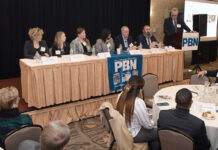A well-known radio personality was speaking with a rainmaker I know. At the end of the conversation the radio person made an interesting comment: “You actually connected with me.” For him that was an unusual experience.
What was unique about the encounter was that many people come up to the radio man to introduce themselves. Most of these introductions are either “fan-based” or people want to connect to a center of influence (did I mention this radio person knows everyone). The motivation for these connections is typically self-serving: knowing the radio guy satisfied a need or offered the potential for usefulness.
Libby Purves wrote an article for The London Times titled “The Unseemly Art of Networking.” The primary premise of the article is that the “overhyped practice of networking” is based on cultivating a friendship with someone specifically because he could be useful to you. The outcome is the approached person, the moment they suspect that comradely affection is dependent on how useful they are, shrinks away.
An owner of an IT firm attended an event for networking. As at most such events everyone gets a minute for a self-introduction. As soon as my friend announced he owned a company he said he instantly felt like “the piece of meat in the pool of piranha.” And he was right; when the introductions ended no less than five people descended him upon.
Three perspectives on networking — the uniqueness of my friend’s encounter with the radio man, the premise of Ms. Purves’ article, and the IT owner’s experience. What they illustrate is how networking has evolved.
Today networking is too frequently the practice of meeting with people in order to expand potential for your opportunities. There is no fault in focusing on your business and how to grow it. Most new business in a B2B environment comes through people and referrals.
The reason an opportunistic mindset creates defensiveness is founded in the way we interact. Inherently, people sense our intention – we humans are expert in sussing out insincerity. When a mismatch in communications occurs (e.g., “I’m so pleased to meet you” thinly veils, “I’m hoping you will help me”), the dynamics of the interchange shift. In a mismatch we process information differently. Our words represent only 7 percent of the actual message we convey. The tone of our voice represents 38 percent. Our nonverbal cues represent 55 percent. The “what’s in it for me” motivation is powerful, so even if you don’t lead with it, people are very likely to pick up on it.
Consider the term “center of influence.” I described the radio man as a center of influence because he figuratively knows everyone. He’s what Malcolm Gladwell referred to as a connector in his book The Tipping Point.
When seeking to expand your connections and people whom you know it is natural to want to meet the connectors. Knowing them certainly expands your opportunities to meet others.
Now think about it from the center of influence’s point of view. People who are true centers of influence have got to feel put upon. Everyone wants to know them and the motivation in most cases has nothing to do with the center of influence as a person.
The best-connected, best-networked people I know practice one thing above all others. They focus on people and relationships. The crème-de la-crème of salespeople rarely if ever “sell” something. They talk to people they know, people with whom they have relationships.
At your next event throw out your elevator pitch and never use it again. It conveys the wrong message and intent. Instead, connect to the person with no ulterior motive except to get to know them. Consider questions like:
• Are you happy to be here?
• What interests you about this group?
• Do you like your business and what you do?
• What’s your favorite thing to do?
• What’s your No. 1 wish for the next 12 months?
Remember the radio man I mentioned earlier. My friend is a true rainmaker because she connected with the person just to get to know him, no hidden agenda. She did not think about opportunities; she thought about building a relationship first and foremost.
Networking is outdated. Building relationships without ulterior motives is what people seek today. Strong relationships are founded in trust, and trust is the greatest currency we can develop. Trust and a strong relationship are the most powerful differentiators you can hope for. And they are the differentiators that are the most difficult, if not impossible, to copy.
Stop thinking like a networker and start thinking like a rainmaker. Build relationships founded on getting to know the person and let the trust develop. Everything else will follow. •
Ken Cook is founder and managing director of Peer to Peer Advisors and developer of The Rainmaker Business Development System.












